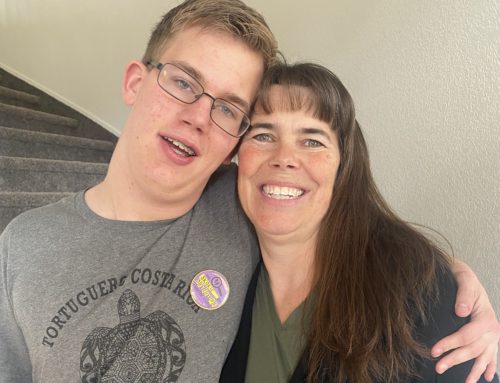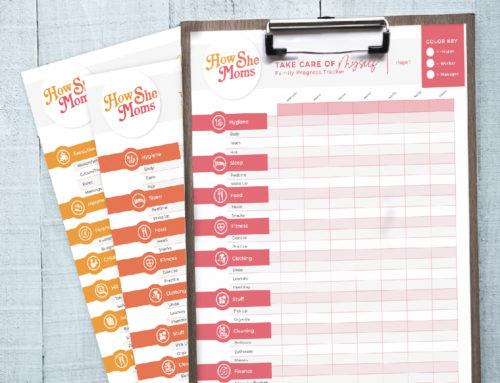In April 2013, I had four kids, ages nine to two, and I was six months pregnant. One month later, we welcomed three more kids into our home through foster care. We knew this was crazy, but we also knew it was what we were meant to do. So we did it.
And chaos—as expected—ensued. One morning after the baby was born, I got the older kids off to school and looked at my kitchen. It was a disaster. I knew I’d have to spend the whole morning cleaning it up, when I already had mounds of laundry to do, toddlers to entertain, and an infant to take care of.
Around the same time, I read an article about young adults who were going off to college and didn’t even know how to start a dishwasher. I vowed that my kids would not become those college students who didn’t know how to clean anything.
In the past, I had tried all sorts of different chore charts, none of which lasted very long. Now I didn’t have time to be trying new things all the time. I needed a system that would work long-term. I decided to simplify and create a basic chore wheel with three circles—one for breakfast chores, one for dinner chores, and one for the rest of the house. Then I sat my kids down and said, “I need help.” I explained the new system, and we jumped right in.
Six years later, we have officially adopted those first three foster kids and we’ve added another baby, bringing our total up to nine. Plus, we still do foster care, so the total number fluctuates. But we’re still using that same system.
Now, on a typical morning, when I come into the kitchen after the kids leave for school, it’s basically clean. I can quickly touch it up and then get on with all the other things—and people—on my list. It’s amazing!
The Chore Wheel
As I mentioned, our system revolves around a simple chore wheel. Each night before I go to bed, I turn the chore wheel, so the kids know what their jobs will be the next morning. Because we have lots of kids, the kitchen chores are very subdivided. I add the kids to the wheel by the time they’re three or four. At this age they’re actually really excited about it. When foster kids join the family I usually team some of the younger kids up and they share a spot on the wheel.
Here are the different chores on each circle of our current wheel:
Breakfast:
· Unload top dishwasher
· Unload bottom dishwasher
· Put away silverware
· Wipe counters
· Clear table
· Set table
· Breakfast dishes
· Helper (whatever else I need help with in the kitchen)
Dinner:
· Floors
· Clear countertops
· Wipe countertops
· Helper
· Clear table
· Set table
· Wash table
· Dinner dishes
Clean-House Jobs:
· Empty a basket. (I keep baskets in the main rooms in the house, which we use to quickly clear clutter from the rooms. Then it’s someone’s chore to empty a basket and distribute the items where they go.)
· Toy room
· Backyard
· Upstairs family room
· Downstairs family room
· Helper
· Bathroom duty
· Vacuum a room
I use the outer circle of the wheel the least. During the school year, they’re just so busy with school and extracurricular activities, that we usually don’t have time for extra jobs until Saturday.
Now that we’ve been using this system for so many years, the kids don’t complain anymore. They just know it’s an expectation, and that our life goes so much more smoothly when they’re doing their jobs.
Morning Free Time
As extra motivation, the kids also know that they can have “morning free time” once they’ve done five things:
1. Breakfast job
2. Get their stuff (backpack, shoes, etc.) by the door, ready for school. This includes a lunch they pack themselves.
3. Practice time (they each play at least one instrument)
4. Exercise
5. Bedroom check
After these things are done, they can play with toys, watch TV, or play on the iPad until it’s time to leave for school. My younger kids are very motivated by morning free time—some even wake up 40 minutes early so they’ll have more time. My older kids are motivated by the fact that they don’t want to have to spend time after school doing the work they didn’t finish in the morning.
I also reward my kids with stars when they get on morning free time. When they get to 10 stars, they get to choose between me checking them out of school for lunch or having a friend over for a late-night.
For some kids I can trust that they finish their morning work when they say they have finished; for others I have to check, based on their personalities and abilities. Some kids, especially foster kids who aren’t used to our system, need extra help along the way to remember to put deodorant on or make their beds.
The best thing about morning free time is that I don’t have to yell at the kids when it’s time to get out the door for school. If I see someone playing in the morning, I just ask, “Are you on morning free time yet?” If not, they know they have to get their stuff done.
In the summer they have a lot more time on their hands (and they make a much bigger mess) so I give them each three clean-house jobs per day. They have to have those three jobs done before they can get on morning free time. Our goal is to get their morning jobs done by at least 11:00 in the summer so we can play in the afternoons.
Now, I’m not so strict that we have to keep this schedule every single day in the summer. There are some days when I only require bedrooms cleaned and teeth brushed because we have so many fun activities planned that day and we need to get out the door. But on the days when we have nothing in the morning, I stay consistent even when I just want to lay in my own bed all day. I force myself up to get going to get my kids going.
Afternoon/Evening Jobs
After school, the kids have a smaller list of jobs to do before they can have free time, as well as completing anything they didn’t finish in the morning:
1. Stuff ‘N Snack (putting their school stuff away and eating an after-school snack)
2. Homework
3. Dinner Job
I make it easy for the kids to put their stuff away after school. We have a big IKEA shelf and each kid has two sections of the shelf. One section is for their backpacks. The other holds a box where they put all their school papers for the year—anything they want to save. It fills up over the year, and when it overflows I have them go through it and get rid of what they don’t want to keep—things like ribbons, school-work they like, etc.
Allowance and the Mom Store
We track the kids’ morning and afternoon chores on a magnet board, with a column for each kid and a list of all their chores. For the older kids, we also use an app called Jallowance to track their chores and what they earn. This allows us to automatically track their earnings, savings, and donations.
Since I administrate the chores all day long, my husband, Kyle, records what they’ve all done at the end of the day and resets the chart.
Kyle also manages allowance. He meets with the kids one-on-one every week or two to review what they’ve done and pay them. The kids have learned the hard way that they don’t get paid if they don’t update their chart. I have a couple who do most of their chores but still make very little money, just because they forget to mark it on the chart.
We vary the pay based on age and ability. We split it up by little, middle, and big kids. Here’s how it breaks down:
Littles
· 10¢ per clean-house job
· 25¢ for getting on morning free time
· 25¢ for finishing afternoon jobs
Middles
· 10¢ per clean-house job
· 50¢ for getting on morning free time
· 25¢ for finishing afternoon jobs
Bigs
· Varying amounts for bigger jobs, like mowing the lawn and babysitting
· $1.25 for getting on morning free time
· 25¢ for finishing afternoon jobs
Because it’s hard to keep enough cash on hand, we pay them in fake gold coins ($.50 per coin). They can trade these in for cash, or pay them to us when they want to buy things on Amazon. They can also redeem these at the “Mom Store,” which is a drawer in my closet full of little toys and prizes. The little kids love the Mom Store because it’s instant gratification. They can’t visit the Mom Store unless they have their chores done for the day.
The key here is to figure out what motivates your kids. For us it’s money for the older kids and the Mom Store for the little ones. For other families it might be screen time or candy.
Quick Cleanups
Of course with this many children around, the house gets cluttered even when the kids get their jobs done. To solve this problem, we started doing quick cleanups. I have three baskets strategically placed in our shared living spaces, plus a small one on the kitchen counter for when I find little stuff. The visible ones are cute, with lids, but sometimes I just use a laundry basket.
When we do a quick cleanup, we just throw everything into the basket. Then emptying that basket becomes one of the clean-house chores on Saturday. As a result, my house looks clean most of the time, even though not everything is technically put away.
I also teach my kids not to walk past something on the floor without picking it up—especially if it’s theirs. I’m finally starting to see the fruits of my labor, and when the kids stop to pick something up I try to praise them for it immediately.
Mom Jobs
There’s always that kid who complains about others who do not appear to be pulling their load. This used to make me crazy, until I found a great solution. Now If they worry about someone else and say, “Well he’s not doing his job…” I tell them they’re acting like a mom, and I ask them if they want a mom job—which are always harder than their regular jobs. They really don’t want mom jobs, so that stops tattling pretty quickly.
I also stopped doing time-outs years ago. Now I just give them extra jobs. I get a lot of work done that way.
Toys
I have a big toy closet downstairs that locks. This is not because I want to restrict my kids from playing with their toys. I unlock it whenever they ask and help them get the toys they want. But if I allow unlimited access to the toys, it doesn’t take long for the kids to dump them all out. Then it’s no fun for anyone. All kids play better when it’s clean and organized.
My kids usually play with their toys in cycles anyway, so I also keep a basket of whatever toys my kids are really into in the moment in their rooms, so they’re easily accessible. When that basket gets full we empty it back into the toy closet.
Bedrooms
Some kids are naturally tidy and some are not. So I’ve had to learn to have different bedroom expectations for different kids, especially for foster kids who may not have learned the habits I’ve taught my kids.
There’s no way I could check every kid’s room every day, but my kids know that every few days I will check, so they usually don’t stash things in their drawers, under beds, or in closets. They know that I’ll just come in and start throwing it all out on their floors.
Each of my kids has a box in their closets where they put things that are special to them but don’t really have a home. We clean those out a couple of times a year, or when they overflow. Usually we end up throwing most of it away when we clean it out.
Laundry
My kids each have an assigned day for laundry once they’re eight or nine. On their day, they bring their laundry to the laundry room and start a cycle. If they start it before school, I change it for them. If not, they’re on their own. Then they put it away by themselves as well.
The little kids put their clothes away after I wash them. I just dump their clothes on the floor, and then I sit with them and coach them while they put all their laundry away. They hang up their shirts (because they’re horrible at folding) and they fold shorts in their drawers.
Saturday Work
My kids know that Saturday is work day. They each have to do three clean-house jobs on Saturdays, which often includes cleaning out the car or working out in the yard in addition to jobs in the house. I usually assign these jobs on the spot, based on what we need.
We enjoy our lazy Saturday mornings, so we usually don’t get started until 9 or 10, which is very late for us!
House Cleaners
Even with all the kids helping, I can’t take care of this many children and my house on my own. There’s always plenty of work left over. So even though my kids “clean” their own bathrooms, I also have house cleaners that come in once a week to help make sure the bathrooms and other parts of the house really get clean. I started having them come when I started doing foster care. I clean alongside them and make sure my kids all know their names and show them respect and gratitude.
Recognizing Finishers
My husband and I are both finishers, so the non-finishers kind of baffle us. For example, if we ask a kid to plant a plant in a pot and they leave the bag of soil and the shovel right next to it on the ground. But that’s not finishing. Finishing is putting the bag in the garbage and putting the tools away.
So, for example, when the kids do their laundry, we teach them to finish by putting the laundry away and then bringing the basket back to the laundry room. We’re always trying to reward and celebrate the kids for finishing, and we teach them that they have to completely finish a task before it counts as being done.
Keep It Simple
Our chore system has evolved over the years, which almost always means it gets simpler. The more complicated the system, the harder it is to administer. In the beginning I was handing out tickets for TV time, coins for jobs, etc. Now we just have coins and the mom store,
It takes a lot of work up front to teach kids to keep the house clean, but eventually it pays off, both for the parents and the kids themselves. I rest assured that each of my kids will know how to work a washer and dryer and clean a house when they leave home—even if their roommates can’t!
About this Mom
Emily Widdison is the mother of nine children and a foster mom to many more. She takes way too many pictures of her cute kiddos, stays up ridiculously late at night, and would love to do more reading if she could carve out the time. She longs for the beach and loves to throw parties. If eating homemade chocolate chip cookies were a hobby it would be at the top of her list. You can read more about Emily’s foster care journey at https://widdywonders.blogspot.com/ and follow her family’s adventures on Instagram @widdywonders.









Great article but even greater system she has devised!👍 I love her term “finishers” that she applies to her and Kyle and how she is trying to get her kids to be “finishers”! I have tried to introduce that concept lately with some of the grandkids. I explained to them that there are some tasks that they can do at the level of 100%. Like clearing their area at the table after eating. Some will bring a dish or two, some will clear everything but leave spills and crumbs behind and so I ask them if they cleared their space 100%. I like that Emily gives special recognition for “finishers”!❤️ I did notice at the family reunion some of the grandkids were trying to be 100 percenters. 👍😍